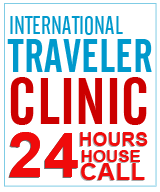VACCINATION ADVICE
VACCINE CLASSIFICATION
Humans acquire immunity from two mechanisms. One is called active immunity, which is acquired from the person’s own immune system after having an infection or vaccination. The second is Passive immunity, which is produced by animals or humans and usually given to humans by injection.
There are two types of vaccines. Live attenuated and inactivated. Live attenuated vaccines are made from modified virus or bacteria, which when given to human, will produce immunity but will not cause illness.
Inactivated vaccines are also composed of viruses or bacteria, but they are not alive and cannot replicate. These types of vaccines require multiple doses.
For travelers, different destinations have different requirements. Usually, vaccinations are divided into three categories: routine, recommended, and required. Therefore, you should see a doctor ideally about 4 to 6 weeks before leaving for your trip, due to the fact that the immune system requires you leave, it is still recommended to see a travel doctor for required vaccines and other medication for specific destinations.
Routine vaccines are recommended even if you do not travel. These are usually childhood diseases, but are still common in some parts of the world; therefore if a traveler is not vaccinated for these, they would be at risk for infection. Examples are measles/mumps/rubella (MMR) vaccine, diphtheria /pertussis/ tetanus (DPT) vaccine, etc.
Recommended vaccines for visiting Thailand and South East Asia include Hepatitis A and B, Typhoid, Rabies, Japanese encephalitis, and Polio. However, please consult with a healthcare provider or travel doctor prior to receiving these vaccinations for more detailed information.
Yellow fever is not a disease risk in Thailand, but the Thai government requires travelers arriving from countries where yellow fever is present (sub-Saharan Africa and tropical South America) to present proof of yellow fever vaccination.
ADVERSE REACTIONS TO VACCINATIONS
Local reactions to vaccinations are pain, swelling, and redness of the injection site. There are common and self-limited. More generalized reactions include fever , headache, muscle pain, and loss of appetite. These can be treated with supportive medications and are self-limited. However, more serious reactions are allergic reactions to the vaccine and can be life threatening. But these are very rare. Symptoms include swelling and itching for the whole body, wheezing, and shock. This requires immediate medical attention.
PREGNANCY AND VACCINATION
There are theoretical concerns of vaccinating pregnant women. There is no evidence that live vaccines cause birth defects or terato-genicity, but it should still not be given to pregnant women.
*Disclaimer : The information provided in this page is only for basic knowledge regarding vaccinations. Please consult with a healthcare provider prior to receiving vaccinations.
All right reserved Global Doctor Clinic Bangkok, Thailand





